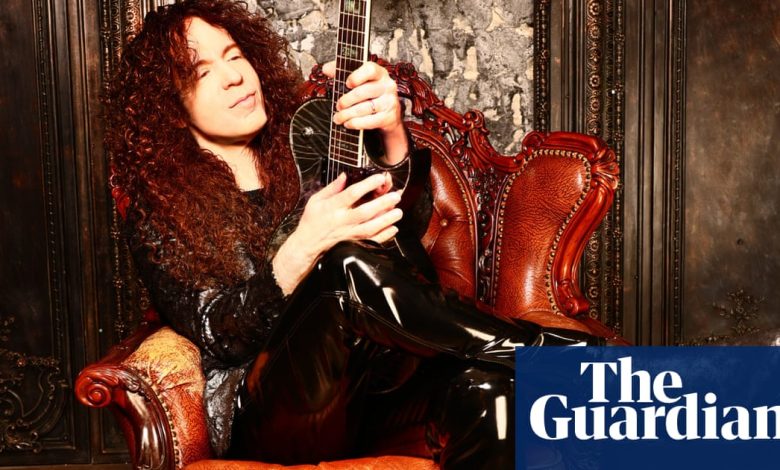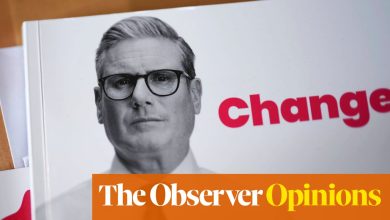From Megadeth to Japanese make-up tutorials: the bizarre life of guitarist Marty Friedman | Megadeth

[ad_1]
Iit’s one of the most perplexing questions in heavy metal history: how does a bullet-riddled guitarist for Megadeth end up criticizing cosmetics on Japanese daytime television? “I became addicted to the challenge: Can I really do this?” laughs Marty Friedman. “And the hardest part was being a judge on a show where these girls were doing makeup. I can’t think of anything in the whole world that I care less about. “Well, she looked better with the foundation after the blush!”
Marty Friedman joined Megadeth in 1990 and helped the thrash group become a platinum mainstream force that decade – one of the genre’s ‘Big Four’ along with Metallica, Slayer and Anthrax – but he left in 2000 and three years later, he left the US altogether to start a new life in Japan, where, in addition to making music as a solo artist, he has established himself as an unlikely but significant pop-culture wonder.
Not only was he called upon to express his opinion on blush, he became the first foreigner to be appointed as a Japanese heritage ambassador, and the government commissioned him to compose the Japanese heritage theme song performed at state events. He has appeared in hundreds of commercials and TV shows, including Hebi Meta-San (Mr Heavy Metal) – championing the genre in millions of Japanese living rooms through Wayne’s world-flavored satire.
“Being broke and homeless at one point, I can appreciate the security of where I was,” he says of his leap from Megadeth into this unfamiliar world. “I don’t want to say it was brave – and some people might think it was stupid because making a living in music is like winning the lottery. But I knew I had a lot more to offer musically than being the lead guitarist in a great metal band.
Friedman spoke in a video call from Los Angeles, where he was filming a music video for his 18th solo album, Drama. Now he makes melodic, instrumental soundscapes, what he calls “musical emotions that bring tears and shivers to people.” There’s no shortage of aggression in his solo catalog – before Megadeth he played with Jason Becker in the similarly hard-hitting Cacophony – but there’s joy in his eyes when he talks about experimenting with key modulations and unorthodox techniques. “I never want to be one of those guys that people say started calling,” he says. “I’ve had success and lack of success, but in a way I’m grateful that I’ve never had a huge hit to define me – I guess it’s kept my music pure. When that happens, the motivation to improve can stop.”
And even after 20 years, Friedman is still fascinated by Japanese society. “[Tokyo] it’s like New York on steroids,” he says. “It’s lively, colorful and there’s a million things to do here, but what I love most is that it’s completely safe. I have never seen anything or felt the slightest fear in 20 years. There’s just no crime, and I live next to the red light district! Once you get used to it, man…”
He first fell in love with the country while on tour and “out of respect for the fans and the staff who treated me so well, I wanted to learn the language and was almost fluent when I left Megadeth. But I was already listening exclusively to Japanese music two or three years earlier – I wanted to release that and immerse myself in the Japanese scene. I was just following my musical dreams.” His status as a local TV personality then grew after a chance meeting with a production company. “It really took off and I was doing all kinds of TV programming – variety shows, comedy, politics, game shows, movies, big commercials. All things I never intended to do.
Friedman has poured it all out in an autobiography, Dreaming Japanese, to be published later this year focusing on what he calls his “transformation in Japanese society.” So many people have asked me about it over the years, saying that no one else has done what I have done. Maybe some people see me as this guitar player who screwed up in Japan to do TV shows and that’s where it all ends for a lot of people, but even my hardcore fans don’t know anything that I put in this book – like the first love, first sexual experiences, marriage, divorce.
There will certainly be stories of controversy – before landing the Megadeth gig in 1990, Friedman unsuccessfully auditioned for Madonna, Kiss and Ozzy Osbourne amid periods of homelessness – but it won’t contain the typical stories of excess that usually can be found in a rock ‘n’ roll memoir: “I was the only one in Megadeth who was completely sober throughout my time in the band, so I have a perspective that’s accurate and from a different point of view.” To write a compelling rock memoir , he says, you don’t necessarily need “tragic near-death experiences or drug overdoses. I think a lot of people want to do crazy things, take risks and leave a comfortable situation to chase a dream – it sounds clichéd, but that’s exactly what I did, and I hope this part is inspiring.”
No other rock band in history has enjoyed a greater wealth of lead guitarist talent than Megadeth. Seven different musicians have played on their 16 studio albums, and given the ever-revolving door, speculation surrounding Friedman’s comeback has lasted for two decades. Last year, the stars briefly aligned when Friedman joined Megadeth live to perform a trio of songs at Tokyo’s famed Budokan arena – including Tornado of Souls, which featured some heady guitar soloing. “People were crying, screaming and smiling from ear to ear. It was just a different night!” he says. “The show couldn’t have been better and to be completely honest the band sounded better than when I was in it.”
He calls it “the perfect reunion,” even though only half of the band’s classic line-up is present. Former drummer Nick Menza died of heart failure aged 51 in 2016 after collapsing during a concert in Los Angeles. Longtime bassist David Ellefson was fired in 2021 following a sex scandal. But Friedman suggests it’s more about him and Dave Mustaine — Megadeth’s steadfast frontman — coming full circle.
“[Mustaine and I] i love myself but it was time to leave the band when i did. The only unfinished business we had was the Budokan. It was equally important to both of us because we’re both rock fans at heart – growing up with Cheap Trick at the Budokan and all our heroes playing there, we both wanted to play it together. Dave grabbed me and said, ‘Dude, have you ever played Budokan?’ I said yes, and he said, ‘Do you want to play it again?’ It was the sweetest exchange.”
Friedman points out that he is still just a resident of Japan, not a citizen, but feels at home in both the US and Tokyo. He visits his mother and other family and friends when he returns to Los Angeles, and says he “misses them terribly,” but says his wife, the cellist Hiyori Okuda, is central to his “entire life” in the bustling Shinjuku area . “What I’ve learned is that home is where you make it. I feel at home in Japan, but as an American, that doesn’t necessarily mean I belong. It’s about co-existence and both sides getting something good out of it. You can live anywhere once you understand this. And,” he laughs, “there’s no better way to learn a language than being on the front lines of a TV show and having to come up with something interesting about something you don’t care about.”
[ad_2]




